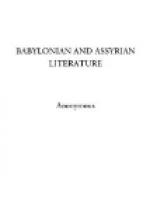[Footnote 2: The Assyrian mistranslates, “A servant (is) Istar.”]
[Footnote 3: The translation given in the text is extremely doubtful.]
[Footnote 4: Literally, “the brilliant one,” a title of the moon-god, which gave rise to the classical legend of Nannarus.]
[Footnote 5: The Assyrian renders this by “Istar.”]
[Footnote 6: Or perhaps “smites.”]
[Footnote 7: Or perhaps “smiter.”]
REVERSE
1 Thou who on the axis of heaven dawnest, in the
dwellings of the
earth her name revolves;
my begetter.
2 (As) Queen of heaven above and below may she
be invoked; my
begetter.
3 The mountains fiercely she hurls-into-the-deep;[1]
my begetter. 4 As to the mountains, their goodly
stronghold (art) thou, their
mighty lock (art) thou;[2]
my begetter.
5 May thy heart rest; may thy liver be magnified.
6 O Lord Anu, the mighty, may thy heart rest. 7
O Lord, the mighty Prince[3] Bel, may thy liver
be magnified. 8 O Istar, the Lady of heaven, may
thy heart rest. 9 O Lady, Queen of heaven, may
thy liver (be magnified). 10 O Lady, Queen of the
House of heaven, may thy heart
(rest).
11 O Lady, Queen of the land of Erech, may thy liver
(be
magnified).
12 O Lady, Queen of the land of the four rivers
of Erech,[4] may
thy heart (rest).
13 O Lady, Queen of the Mountain of the World,[5]
may thy
liver (be magnified).
14 O Lady, Queen of the Temple of the Resting-place
of the
world, may thy heart
(rest).
15 O Lady, Queen of Babylon, may thy liver (be magnified).
16 O Lady, Queen of the Memorial of Nan’a,
may thy heart
(rest).
17 O Queen of the Temple, Queen of the gods, may
thy liver
(be magnified).
18 Prayer of the heart to Istar.
19 Like its original[6] written and translated.
20 Palace of Assur-bani-pal, King of Assyria; 21
Son of Esar-haddon, King of multitudes, King of Assyria,
high-priest of Babylon,
22 King of Sumer and Accad, King of the Kings of
Cush and
Egypt,
23 King of the four zones; Son of Sennacherib,
24 King of multitudes, King of Assyria; 25 who
to Assur and Beltis, Nebo and Tasmit trusts. 26
Thy kingdom, O light of the gods.
[Footnote 1: The Assyrian mistranslates, “I hurl into the deep.”]
[Footnote 2: The Assyrian mistranslates “I” for “thou.”]
[Footnote 3: “Sadi” in Assyrian, literally “mountain” or “rock,” and apparently connected with the Hebrew “Shaddai,” as in the phrase “El Shad-dai,” “God Almighty.”]
[Footnote 4: Possibly the four rivers of Paradise.]
[Footnote 5: Also called the “Mountain of the East,” Mount Elwand on which the ark rested.]
[Footnote 6: That is the text from which the Assyrian copy was made for the library of Assurbanipal.]




